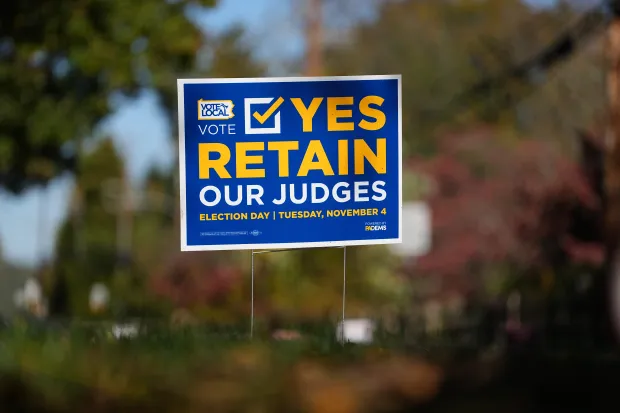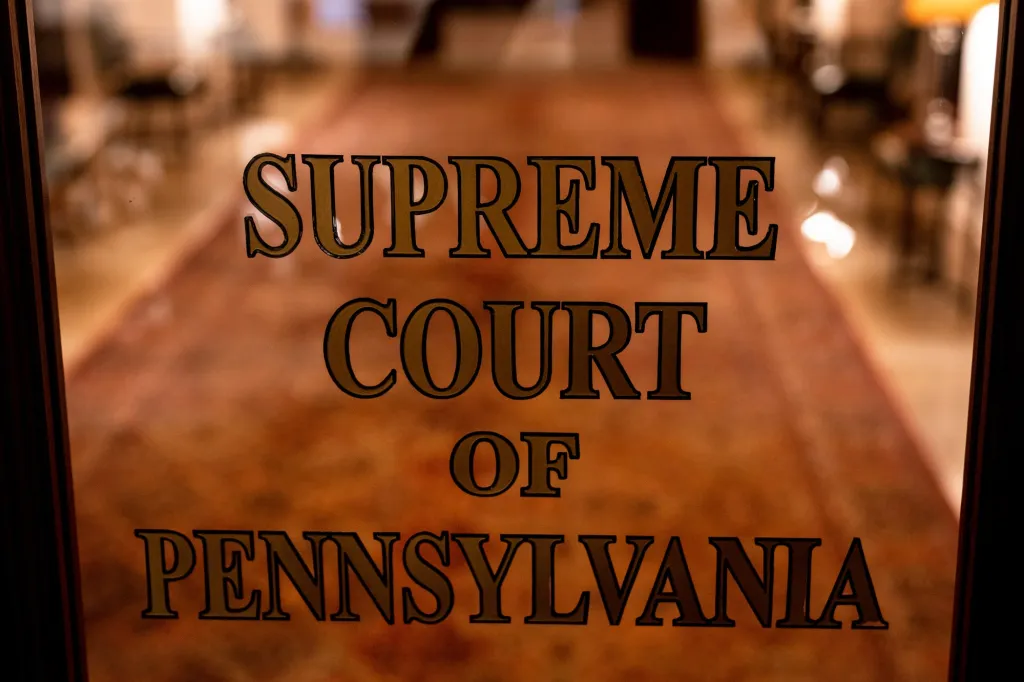CRANBERRY TWP. — Control of the Pennsylvania Supreme Court hangs in the balance in statewide elections next week, when voters will cast ballots on judges for the state’s three highest courts. In Lackawanna County voters also will cast ballots in a special election for commissioner and in municipal races.
State Supreme Court Justices Christine Donohue, Kevin Dougherty and David Wecht — all Democrats — will appear on the Nov. 4 ballot in a retention election, where voters will decide whether to award the sitting jurists new terms on the high court. Terms are 10 years, although Donohue must retire in 2027 when she reaches the mandated retirement age of 75. While retention elections are often a quiet affair in Pennsylvania, this year’s campaign has been heavily shaped by party politics.
Democrats hold a 5-2 majority on the state Supreme Court, but Republicans have mounted a campaign to oust Donohue, Dougherty and Wecht. If voters decide not to retain a justice for another term, Democratic Gov. Josh Shapiro could appoint a temporary replacement, subject to confirmation by the Republican-controlled state Senate. A deadlock in the confirmation process could result in a court tied at 2-2 if voters oust all three justices this year. An election to fill any vacant seats for full 10-year terms would be held in 2027.
The last state Supreme Court retention election was in 2017. The Republican justice on the ballot that year was retained with 68% of the vote, while the Democratic justice was retained with 71% of the vote.
A sign is posted Oct. 22 in Berwyn in opposition to retaining Pennsylvania Supreme Court justices in the Nov. election. (AP Photo/Matt Rourke)

A sign is posted Oct. 22 in Berwyn in support of retaining Pennsylvania Supreme Court justices in the Nov. election. (AP Photo/Matt Rourke)
Show Caption
1 of 2
A sign is posted Oct. 22 in Berwyn in opposition to retaining Pennsylvania Supreme Court justices in the Nov. election. (AP Photo/Matt Rourke)
Voters will also decide races for other state courts, including the state Superior Court and Commonwealth Court, the two statewide appellate courts a step below the state Supreme Court.
What else is on the ballot?
In Lackawanna County, three candidates — Democrat Thom Welby of Scranton, Republican Chet Merli of Blakely and independent candidate Michael Cappellini of Jessup — are vying in a special election to fill the remainder of former Democratic Commissioner Matt McGloin’s unexpired term. Former county Economic Development Director Brenda Sacco was appointed recently to the seat left vacant since McGloin’s resignation in late February. She’s expected to serve until the results of the special election are certified.
While the appointment is temporary, Sacco had said she hoped to hold the seat for the remainder of the term, which runs into early January 2028. In a social media post late Thursday, Sacco addressed the special election, saying “There is a lot of concern regarding whether I will honor the lawful result of this special election — of course, I will. … I’m here to serve as Commissioner for however long that turns out to be.”
In Scranton, voters face a stark choice in the mayoral race. Incumbent Mayor Paige Gebhardt Cognetti, a Democrat, seeks her second four-year term. She’s challenged by Republican Patricia “Trish” Beynon and independents Eugene “Gene” Barrett and Rik Little. Also, three of the five four-year council seats are up for grabs. The six candidates in that race are Virgil Argenta, Patrick Flynn, Sean McAndrew, Marc Pane, incumbent Councilman Tom Schuster and incumbent council President Gerald Smurl.
Also in the city, five candidates seek four open seats on the Scranton School Board. The candidates are board Vice President Danielle Chesek, Director Jenna Strzelecki, retired district Chief Information Officer Joe Brazil, former Director Carol J. Cleary and former Scranton City Council candidate John Howe.
Voters throughout Lackawanna County will also cast ballots in mayor, council and school board races.
Here’s a look at what else to expect Nov. 4:
When to vote?
Election Day polls open at 7 a.m. and close at 8 p.m. Anyone waiting in line to vote by 8 p.m. is legally permitted to cast their ballot.
Lackawanna County will have a drop box available in the vestibule of the county government center, 123 Wyoming Ave., Scranton, for voters to physically return mail-in ballots until 8 p.m. All mail-in ballots must be received by county elections departments by 8 p.m. to be counted.
Who gets to vote?
Any voter registered in Pennsylvania may participate in the statewide general elections.
What do turnout and advance vote look like?
As of Oct. 6, there were about 3.8 million Democrats and 3.6 million Republicans registered in Pennsylvania.
About 3.1 million votes were cast in the 2023 state Supreme Court general election, or roughly 36% of registered voters at the time. Mail votes comprised about 26% of the total votes cast.
As of Monday, more than 571,000 of the 1.1 million absentee ballots requested statewide had already been cast. About 67% of these votes came from Democrats and about 25% were from Republicans.
Voting issues?
Voters who experience issues at the polls should raise them with the judge of elections at their polling place and contact their county election office if necessary. To report problems with voting or questionable practices, call:
Lackawanna County: 570-963-6737
Luzerne County: 570-825-1715
Monroe County: 570-517-3165
Pike County: 570-296-3427
Susquehanna County: 570-278-4600, x4090 or 570-278-6697
Wayne County: 570-253-5978
Wyoming County: 570-996-2224 or 570-996-2226
What prompts a recount?
Pennsylvania requires an automatic recount for statewide races with a vote margin of 0.5 percentage points or less. For non-statewide races, voters may petition an individual county board of elections or the courts to order a recount.
What’s next?
As of Nov. 4, there will be 364 days until the 2026 midterm elections and 1,099 days until the 2028 general election.
Associated Press writers Marc Levy and Robert Yoon contributed to this report.

